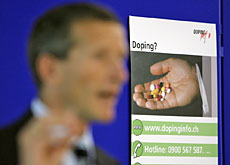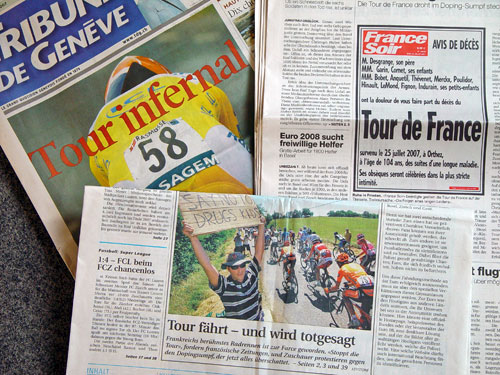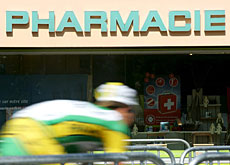Anti-doping agency gets cash injection

Swiss Olympic, the country's umbrella organisation of sport, says it will contribute an additional SFr1 million ($830,000) to the fight against doping.
The money is a welcome boost for the planned independent National Anti-Doping Agency (Nada), which is set to begin operation next year. But more funds are needed and experts have called on the government to exercise their spending muscles.
“We should give confidence back to the population and especially young athletes that you can get to the very top, Olympic level and win a gold medal without doping,” Marc-André Giger, CEO of Swiss Olympic, told swissinfo.
“The World Anti-Doping Agency (Wada) is very satisfied with the work we are doing [in Switzerland] in terms of quality, but it is not satisfied with the quantity – and that is why we are investing more money.”
Giger said on Wednesday it was important to give off the signal that Swiss Olympic was aware of the situation in sport and was moving with the times.
However, he called on the government to contribute more and to enable more anti-doping controls to be carried out in Switzerland.
The cost of the Nada, which is set to step into operation next year, is estimated at SFr5 million, but at present there is only SFr2.55 million available to fight doping. Giger called on politicians to pressure the government to make up the shortfall.
“We have to build up the amount of controls to give athletes the signal that cheating is not worth it,” he said.
Not enough controls
In 2006, 1,855 anti-doping controls were made, of which 1,027 were out of competition and 828 during competition.
The sports where most checks were carried out were cycling, skiing, triathlon, athletics and football. In addition, 238 controls were carried out among elite junior athletes and 122 abroad.
As a result of these checks the Swiss Olympic Association’s Disciplinary Chamber for Doping Infractions (DC) reported 18 positive cases, exactly the same as the previous year. These involved seven cannabis cases – of which three were among pool players.
Four athletes refused to undergo a check and a two-year-competition ban was imposed by the DC on all four.
Giger believes the current two-year ban for those found guilty is adequate, “but the problem is we do not have controls to get all those people who should be punished”.
“Sporting family”
But it’s not just a question of money, according to Matthias Remund, director of the Federal Sport Office. He called on the “entire sporting family” to stand up against doping and for the media “to write what they know”.
Matthias Kamber, head of the federal anti-doping authorities, hopes athletes, coaches and medical doctors speak with one voice in order to regain public confidence.
“I would like to hear them all saying ‘We don’t want doping’,” he told swissinfo.
Public confidence certainly needs rebuilding: according to a recent survey, three-quarters of Swiss think most Tour de France riders take drugs.
Kamber highlighted the main challenges in the fight to remain one step ahead of the drug-users in what is effectively a pharmaceutical arms race.
“We have to have better out-of-competition tests and better targeting of specific athletes.
“Then we also need better analysis of certain substances that we can’t detect now, such as insulin or human growth hormone. We must also definitely have better prevention and education as well.”
Kamber said he was an optimist but also a realist. “You will never completely remove doping from top-level sport, but we would like to make it an exception not the norm, as it is in certain sports.”
swissinfo, Thomas Stephens
The annual budget of the anti-doping campaign is SFr2.55 million (of which the government contributes SFr1.85 million and Swiss Olympic SFr700,000) and covers controls, information, prevention and research.
In 2006, 1,855 checks were carried out (1,027 out of competition, 828 during competition). This compares with 1,369 and 718 respectively in 2005.
In 2006 the Disciplinary Chamber for Doping Infractions dealt with 18 positive cases.
Independent experts reckon the quality of controls in Switzerland is high. However, according to a group of experts from the European Council, the number of controls made in Switzerland should be higher, and there should be more controls during training than during competitions.
Doping cases abounded on this year’s Tour De France cycling race:
Germany’s Patrik Sinkewitz was the first rider to test positive after a testosterone examination.
Alexandre Vinokourov was forced out of this year’s Tour, along with all members of the Astana team, after he tested positive for a banned blood transfusion.
Michael Rasmussen of Denmark was removed from the race by his Rabobank team. The expulsion was linked to “incorrect” information that he gave to the team’s sports director. He also missed random drugs tests by the International Cycling Union.
Christian Moreni of Italy failed a doping test, prompting the withdrawal of the entire Cofidis team.

In compliance with the JTI standards
More: SWI swissinfo.ch certified by the Journalism Trust Initiative




You can find an overview of ongoing debates with our journalists here . Please join us!
If you want to start a conversation about a topic raised in this article or want to report factual errors, email us at english@swissinfo.ch.